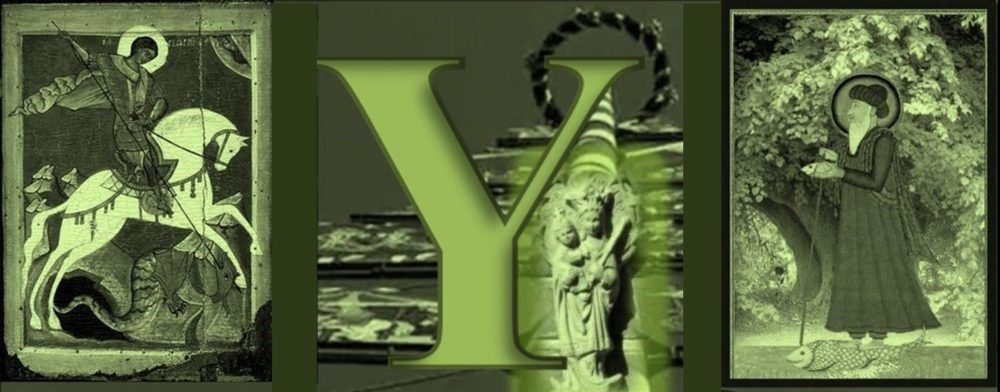Prayer for our Times

- Forty rules of love Persian Sufi – Shams of Tabriz 1185-1248
Rule 1
How we see God is a direct reflection of how we see ourselves. If God brings to mind mostly fear and blame, it means there is too much fear and blame welled inside us. If we see God as full of love and compassion, so are we.
Rule 2
The path to the Truth is a labour of the heart, not of the head. Make your heart your primary guide! Not your mind. Meet, challenge and ultimately prevail over your nafs (self, psyche, soul) with your heart. Knowing your ego will lead you to the knowledge of God.
Rule 3
You can study God through everything and everyone in the universe, because God is not confined in a mosque, synagogue or church. But if you are still in need of knowing where exactly His abode is, there is only one place to look for him: in the heart of a true lover.
Rule 4
Intellect and love are made of different materials. Intellect ties people in knots and risks nothing, but love dissolves all tangles and risks everything. Intellect is always cautious and advises, ‘Beware too much ecstasy’, whereas love says, ‘Oh, never mind! Take the plunge!’ Intellect does not easily break down, whereas love can effortlessly reduce itself to rubble. But treasures are hidden among ruins. A broken heart hides treasures.
Rule 5
Most of problems of the world stem from linguistic mistakes and simple misunderstanding. Don’t ever take words at face value. When you step into the zone of love, language, as we know it becomes obsolete. That which cannot be put into words can only be grasped through silence.
Rule 6
Loneliness and solitude are two different things. When you are lonely, it is easy to delude yourself into believing that you are on the right path. Solitude is better for us, as it means being alone without feeling lonely. But eventually it is the best to find a person who will be your mirror. Remember only in another person’s heart can you truly see yourself and the presence of God within you.
Rule 7
Whatever happens in your life, no matter how troubling things might seem, do not enter the neighbourhood of despair. Even when all doors remain closed, God will open up a new path only for you. Be thankful! It is easy to be thankful when all is well. A Sufi is thankful not only for what he has been given but also for all that he has been denied.
Rule 8
Patience does not mean to passively endure. It means to look at the end of a process. What does patience mean? It means to look at the thorn and see the rose, to look at the night and see the dawn. Impatience means to be shortsighted as to not be able to see the outcome. The lovers of God never run out of patience, for they know that time is needed for the crescent moon to become full.
Rule 9
East, west, south, or north makes little difference. No matter what your destination, just be sure to make every journey a journey within. If you travel within, you’ll travel the whole wide world and beyond.
Rule 10
The midwife knows that when there is no pain, the way for the baby cannot be opened and the mother cannot give birth. Likewise, for a new self to be born, hardship is necessary. Just as clay needs to go through intense heat to become strong, Love can only be perfected in pain.
Rule 11
The quest for love changes user. There is no seeker among those who search for love who has not matured on the way. The moment you start looking for love, you start to change within and without.
Rule 12
There are more fake gurus and false teachers in this world than the number of stars in the visible universe. Don’t confuse power-driven, self-centered people with true mentors. A genuine spiritual master will not direct your attention to himself or herself and will not expect absolute obedience or utter admiration from you, but instead will help you to appreciate and admire your inner self. True mentors are as transparent as glass. They let the light of God pass through them.
Rule 13
Try not to resist the changes, which come your way. Instead let life live through you. And do not worry that your life is turning upside down. How do you know that the side you are used to is better than the one to come?
Rule 14
God is busy with the completion of your work, both outwardly and inwardly. He is fully occupied with you. Every human being is a work in progress that is slowly but inexorably moving toward perfection. We are each an unfinished work of art both waiting and striving to be completed. God deals with each of us separately because humanity is fine art of skilled penmanship where every single dot is equally important for the entire picture.
Rule 15
It’s easy to love a perfect God, unblemished and infallible that He is. What is far more difficult is to love fellow human being with all their imperfections and defects. Remember, one can only know what one is capable of loving. There is no wisdom without love. Unless we learn to love God’s creation, we can neither truly love nor truly know God.
Rule 16
Real faith is the one inside. The rest simply washes off. There is only one type of dirt that cannot be cleansed with pure water, and that is the stain of hatred and bigotry contaminating the soul. You can purify your body through abstinence and fasting, but only love will purify your heart.
Rule 17
The whole universe is contained within a single human being-you. Everything that you see around, including the things that you might not be fond of and even the people you despise or abhor, is present within you in varying degrees. Therefore, do not look for Shaitan (devil) outside yourself either. The devil is not an extraordinary force that attacks from without. It is an ordinary voice within. If you set to know yourself fully, facing with honesty and hardness.
Rule 18
If you want to change the ways others treat you, you should first change the way you treat yourself, fully and sincerely, there is no way you can be loved. Once you achieve that stage, however, be thankful for every thorn that others might throw at you. It is a sign that you will soon be showered in roses.
Rule 19
Fret not where the road will take you. Instead concentrate on the first step. That is the hardest part and that is what you are responsible for. Once you take that step let everything do what it naturally does and the rest will follow. Don’t go with the flow. Be the flow.
Rule 20
We were all created in His image, and yet we were each created different and unique. No two people are alike. No hearts beat to the same rhythm. If God had wanted everyone to be the same, He would have made it so. Therefore, disrespecting differences and imposing your thoughts on others is an amount to disrespecting God’s holy scheme.
Rule 21
When a true lover of God goes into a tavern, the tavern becomes his chamber of prayer, but when a wine bibber goes into the same chamber, it becomes his tavern. In everything we do, it is our hearts that make the difference, not our outer appearance. Sufis do not judge other people on how they look or who they are. When a Sufi stares at someone, he keeps both eyes closed instead opens a third eye – the eye that sees the inner realm.
Rule 22
Life is a temporary loan and this world is nothing but a sketchy imitation of Reality. Only children would mistake a toy for the real thing. And yet human beings either become infatuated with the toy or disrespectfully break it and throw it aside. In this life stay away from all kinds of extremities, for they will destroy your inner balance. Sufis do not go to extremes. A Sufi always remains mild and moderate.
Rule 23
The human being has a unique place among God’s creation. “I breathed into him of My Spirit,” God says. Each and every one of us without exception is designed to be God’s delegate on earth. Ask yourself, just how often do you behave like a delegate, if you ever do so? Remember, it fells upon each of us to discover the divine spirit inside and live by it.
Rule 24
Hell is in the here and now. So is heaven. Quit worrying about hell or dreaming about heaven, as they are both present inside this very moment. Every time we fall in love, we ascend to heaven. Every time we hate, envy or fight someone we tumble straight into the fires of hell.
Rule 25
Each and every reader comprehends the Holy Qur’an on a different level of tandem with the depth of his understanding. There are four levels of insight. The first level is the outer meaning and it is the one that the majority of the people are content with. Next is the Batin – the inner level. Third, there is the inner of the inner. And the fourth level is so deep it cannot be put into words and is therefore bound to remain indescribable.
Rule 26
The universe is one being. Everything and everyone is interconnected through an invisible web of stories. Whether we are aware of it or not, we are all in a silent conversation. Do no harm. Practice compassion. And do not gossip behind anyone’s back – not even a seemingly innocent remark! The words that come out of our mouths do not vanish but are perpetually stored in infinite space and they will come back to us in due time. One man’s pain will hurt us all. One man’s joy will make everyone smile.
Rule 27
Whatever you speak, good or evil, will somehow come back to you. Therefore, if there is someone who harbours ill thoughts about you, saying similarly bad things about him will only make matters worse. You will be locked in a vicious circle of malevolent energy. Instead for forty days and nights say and think nice things about that person. Everything will be different at the end of 40 days, because you will be different inside.
Rule 28
The past is an interpretation. The future is an illusion. The world does not move through time as if it were a straight line, proceeding from the past to the future. Instead time moves through and within us, in endless spirals. Eternity does not mean infinite time, but simply timelessness. If you want to experience eternal illumination, put the past and the future out of your mind and remain within the present moment.
Rule 29
Destiny doesn’t mean that your life has been strictly predetermined. Therefore, to live everything to the fate and to not actively contribute to the music of the universe is a sign of sheer ignorance. The music of the universe is all pervading and it is composed on 40 different levels. Your destiny is the level where you play your tune. You might not change your instrument but how well to play is entirely in your hands.
Rule 30
The true Sufi is such that even when he is unjustly accused, attacked and condemned from all sides, he patiently endures, uttering not a single bad word about any of his critics. A Sufi never apportions blame. How can there be opponents or rivals or even “others” when there is no “self” in the first place? How can there be anyone to blame when there is only One?
Rule 31
If you want to strengthen your faith, you will need to soften inside. For your faith to be rock solid, your heart needs to be as soft as a feather. Through an illness, accident, loss or fright, one way or another, we are all faced with incidents that teach us how to become less selfish and judgmental and more compassionate and generous. Yet some of us learn the lesson and manage to become milder, while some others end up becoming even harsher than before…
Rule 32
Nothing should stand between you and God. No imams, priests, rabbits or any other custodians of moral or religious leadership. Not spiritual masters and not even your faith. Believe in your values and your rules, but never lord them over others. If you keep breaking other people’s hearts, whatever religious duty you perform is no good. Stay away from all sorts of idolatry, for they will blur your vision. Let God and only God be your guide. Learn the Truth, my friend, but be careful not to make a fetish out of your truths.
Rule 33
While everyone in this world strives to get somewhere and become someone, only to leave it all behind after death, you aim for the supreme stage of nothingness. Live this life as light and empty as the number zero. We are no different from a pot. It is not the decorations outside but the emptiness inside that holds us straight. Just like that, it is not what we aspire to achieve but the consciousness of nothingness that keeps us going.
Rule 34
Submission does not mean being weak or passive. It leads to neither fatalism nor capitulation. Just the opposite. True power resides in submission a power that comes within. Those who submit to the divine essence of life will live in unperturbed tranquility and peace even the whole wide world goes through turbulence after turbulence.
Rule 35
In this world, it is not similarities or regularities that take us a step forward, but blunt opposites. And all the opposites in the universe are present within each and every one of us. Therefore the believer needs to meet the unbeliever residing within. And the nonbeliever should get to know the silent faithful in him. Until the day one reaches the stage of Insane-I Kamil, the perfect human being, faith is a gradual process and one that necessitates its seeming opposite: disbelief.
Rule 36
This world is erected upon the principle of reciprocity. Neither a drop of kindness nor a speck of evil will remain unreciprocated. For not the plots, deceptions, or tricks of other people. If somebody is setting a trap, remember, so is God. He is the biggest plotter. Not even a leaf stirs outside God’s knowledge. Simply and fully believe in that. Whatever God does, He does it beautifully.
Rule 37
God is a meticulous clock maker. So precise is His order that everything on earth happens in its own time. Neither a minute late nor a minute early. And for everyone without exception, the clock works accurately. For each there is a time to love and a time to die.
Rule 38
It is never too late to ask yourself, “Am I ready to change the life I am living? Am I ready to change within?” Even if a single day in your life is the same as the day before, it surely is a pity. At every moment and with each new breath, one should be renewed and renewed again. There is only one-way to be born into a new life: to die before death.
Rule 39
While the part change, the whole always remains the same. For every thief who departs this world, a new one is born. And every descent person who passes away is replaced by a new one. In this way not only does nothing remain the same but also nothing ever really changes. For every Sufi who dies, another is born somewhere.
Rule 40
A life without love is of no account. Don’t ask yourself what kind of love you should seek, spiritual or material, divine or mundane, Eastern or Western. Divisions only lead to more divisions. Love has no labels, no definitions. It is what it is, pure and simple. Love is the water of life. And a lover is a soul of fire! The universe turns differently when fire loves water..
Shams Tabriz, Rumi’s Teacher
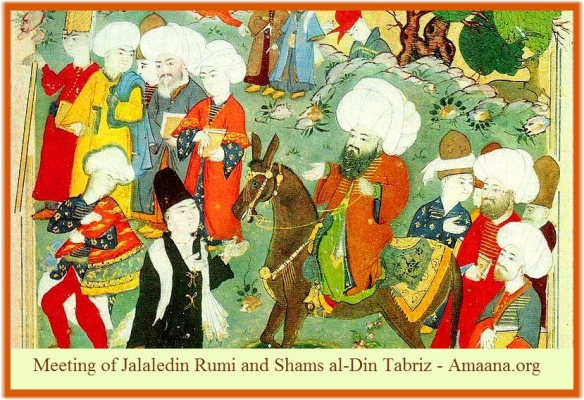
Shams-i-Tabrīzī (Persian: شمس تبریزی) or ‘Shams al-Din Mohammad’ (1185–1248) was a Persian Muslim, who is credited as the spiritual instructor of Mewlānā Jalāl ad-Dīn Muhammad Balkhi, also known as Rumi and is referenced with great reverence in Rumi’s poetic collection, in particular Diwan-i Shams-i Tabrīzī (The Works of Shams of Tabriz). Tradition holds that Shams taught Rumi in seclusion in Konya for a period of forty days, before fleeing for Damascus. The tomb of Shams-i Tabrīzī was recently nominated to be a UNESCO World Heritage Site.
According to Sipah Salar, a devotee and intimate friend of Rumi who spent forty days with him, Shams was the son of the [Ismaili] ‘Imam Ala al-Din’. In a work entitled Manāqib al-‘arifīn (Eulogies of the Gnostics), ‘Aflaki’ names a certain ‘Ali as the father of Shams-i Tabrīzī and his grandfather as Malikdad. Apparently basing his calculations on Haji Bektash Veli’s Maqālāt (Conversations), Aflaki suggests that Shams arrived in Konya at the age of sixty years. However, various scholars have questioned Aflaki’s reliability.
Shams received his education in Tabriz and was a disciple of ‘Baba Kamal al-Din Jumdi’. Before meeting Rumi, he apparently traveled from place to place weaving baskets and selling girdles for a living. Despite his occupation as a weaver, Shams received the epithet of “the embroiderer” (zarduz) in various biographical accounts including that of the Persian historian ‘Dawlatshah’. This however, is not the occupation listed by Haji Bektash Veli in the ”Maqālat” and was rather the epithet given to the Ismaili Imam Shams al-din Muhammad, who worked as an embroiderer while living in anonymity in Tabriz. The transference of the epithet to the biography of Rumi’s mentor suggests that this Imam’s biography must have been known to Shams-i Tabrīzī’s biographers. The specificities of how this transference occurred, however, are not yet known.
Shams’ first encounter with Rumi
On 15 November 1244, a man in a black suit from head to toe, came to the famous inn of Sugar Merchants of Konya. His name was Shams Tabrizi. He was claiming to be a travelling merchant. As it was said in Haji Bektash Veli’s book, “Makalat”, he was looking for something. Which he was going to find in Konya. Eventually he found Rumi riding a horse.
One day Rumi was reading next to a large stack of books. Shams Tabriz, passing by, asked him, “What are you doing?” Rumi scoffingly replied, “Something you cannot understand.” On hearing this, Shams threw the stack of books into a nearby pool of water. Rumi hastily rescued the books and to his surprise they were all dry. Rumi then asked Shams, “What is this?” To which Shams replied, “Mowlana, this is what you cannot understand.”
A second version of the tale has Shams passing by Rumi who again is reading a book. Rumi regards him as an uneducated stranger. Shams asks Rumi what he is doing, to which Rumi replies, “Something that you do not understand!” At that moment, the books suddenly catch fire and Rumi asks Shams to explain what happened. His reply was, “Something you do not understand.”
Read more: Shams, 1183-1248
- THE QUTB
 Sufis define Qutb as a conjoining of the magnetic axis of the cosmos and the spiritual axis of human consciousness. When a renewer of the Way is needed, the Qutb wisdom-field can appear as a person. Working deeply in the river of human events, the Qutb is sometimes hidden, sometimes not, but always known to the community of saints. As a his-torical figure, the Qutb may parallel the Avatars of Vedic tradition. By all evidence Jellaludin Rumi and Bawa Muhaiyaddeen were Qutbs.
Sufis define Qutb as a conjoining of the magnetic axis of the cosmos and the spiritual axis of human consciousness. When a renewer of the Way is needed, the Qutb wisdom-field can appear as a person. Working deeply in the river of human events, the Qutb is sometimes hidden, sometimes not, but always known to the community of saints. As a his-torical figure, the Qutb may parallel the Avatars of Vedic tradition. By all evidence Jellaludin Rumi and Bawa Muhaiyaddeen were Qutbs. 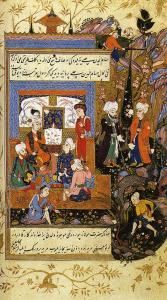

Both taught with an oceanic tide of words: Rumi produced a vast body of poetry; Bawa was a living Thousand and One Nights. There were talks and stories, and stories within stories, songs, accounts of mystic joumeys, and an endless supply of droll folktales. Lots of ego-disabling laughter kept things loose. But this was abundance with an edge: when the sluice gates were open and pouring, the sudden realization would come that you were trying to catch a torrent from the Other Side in a mental thimble! Rumi said it: The way of love is not a subtle argument. The door there is devastation.
An another Qutb and Inspirator for this website is Sheikh Nazim Al-Haqqani:

Sheikh Nazim Al-Haqqani as leader of the Naqshbandi
With this grant of the Attribute of Al Haqq or the ‘Truth’, Moulana Sheikh Nazim was also entrusted with the task to complete the Haqq or the ‘Truth’ in the hearts of those to whom the Light of Muhammad ur Rasoolullah has still not reached.
Naqshbandi History and HAMD ( Praising) OF MUHAMMAD (Sal)
More info on Sufi Path of Love Platform Naqshbandi Haqqani Rabbani
The Qutb’s work is to expose a patch of yielding soil where a well might be dug. Ours is to become a kind of’ Iife that sips only from its wisdom-water.
You are water we are plants.
You are fullness, we ‘re empty.
You speak. We are the sound of your different voices.
You ‘re the search,
Why aren’t we found?
When we resisted, preferring the solid predictability of our old inertial intelligence, his teaching could turn as paradoxical as a Zen koan. The sudden clap of thunder and the room was full of heads flying off shoulders. We needed new heads, ones that could hold both a night sky and brilliant daylight in their sight at once. The Qutb confuses the mind to strengthen the soul.
The metaphysical environment into which The Prayer was introduced was outside the tangled accretions of history. It was a place where Islam didn’t mean a religion or culture or even a belief system, but a bright burning state with a quicksilver universality too elusive and grand for anyone’s ownership.
“Everything is Islam. Islam is the spotless purity of the heart, it is a vast ocean. If God’s teaching is there, it is Islam. To act out the qualities of truth and embrace with true love, that is Islam. The tired hearts, the hurt ones, to embrace them with love, and give them the milk of love, embrace them face-to-face, heart-to-heart, in unity, that is Islam.
Only much later did we learn that Bawa was only repeating how the words Islam and Muslim first fell from the lips of the holy Prophet. Fresh from mystical dimensions, they meant “man’s self-surrender to God” and “one who surrendered himself to God,” apparently without limiting their compass to any specific community.
In the third sura, or passage, of the Quran, for instance, Abraham is spoken of as having “surrendered himself unto God” (kana muslim), and later the disciples of Jesus say, “Bear thou witness that we have surrendered ourselves unto God” (bi-anna muslim).
Bawa Muhaiyaddeen would not claim spotless purity for himself, only that God alone knows our hearts. And Bawa did not like the way labels create divisions today. To indicate “what” he was, he would relate the many years he had traveled the world mastering the other religions, explaining that he had now become a student of Islam because he understood that it was the final revelation of a great cycle of revelations.
When a child asked him one day what to say when asked what religion she was, Bawa gave another hint of how his community might understand itself:
You are a Christian because you believe in Jesus, and you are a Jew because you believe in all the prophets including Moses. You are a Muslim because you believe in Muhammad as a prophet, and you are a Sufi because you believe in the universal teaching of God’s r love. You are really none of those, but you are all of those because you believe in God. And once you believe in God, there is no religion. Once you divide yourself off with religions, you are separated from your fellowman.
From a twelfth-century illumination showing Muslims, Christians, and Jews sitting in the lap of Abraham.
- Prayer for our times
The Prayer is an excellent act, but its spirit and meaning are more excellent than its form, even as the human spirit is more excellent and more enduring than the form. For the human form does not abide forever, but the spirit does. In the same way, the form of The Prayer does not remain,but its meaning and spirit do.


From the book Illuminated Prayer Coleman Barks/Michael Green
You are a Christian because you believe in Jesus, and you are a Jew because you believe in all the prophets including Moses. You are a Muslim because you believe in Muhammad as a prophet, and you are a Sufi because you believe in the universal teaching of God’s love. You are really none of those, but you are all of those because you believe in God. And once you believe in God, there is no religion. Once you divide yourself off with religions, you are separated from your fellowman.
What is it that we really love? What is the stronger pull? Behavioral scientists believe that immediately after birth, we enjoy a happy blurring of the distinction between “self” and “non-self,” but that before too long in our life-trajectory, we pull our-selves free of such oceanic unity and we individuate.
 It’s a fascinating new experience: Me! Years go by, life experience accumulates. We slowly discover that our self-entity exists within an atmosphere of aloneness and separation. Our first instinct is to break out of the isolation with a lot of grasping and pos-sessing—friends, lovers, food, cars, money, land, whatever. We try to dull the ache with entertainment, understand it with philosophy, or accept it in therapy. No matter. Nothing quite delivers the abiding wholeness we sense is really the way we ought to be.
It’s a fascinating new experience: Me! Years go by, life experience accumulates. We slowly discover that our self-entity exists within an atmosphere of aloneness and separation. Our first instinct is to break out of the isolation with a lot of grasping and pos-sessing—friends, lovers, food, cars, money, land, whatever. We try to dull the ache with entertainment, understand it with philosophy, or accept it in therapy. No matter. Nothing quite delivers the abiding wholeness we sense is really the way we ought to be.
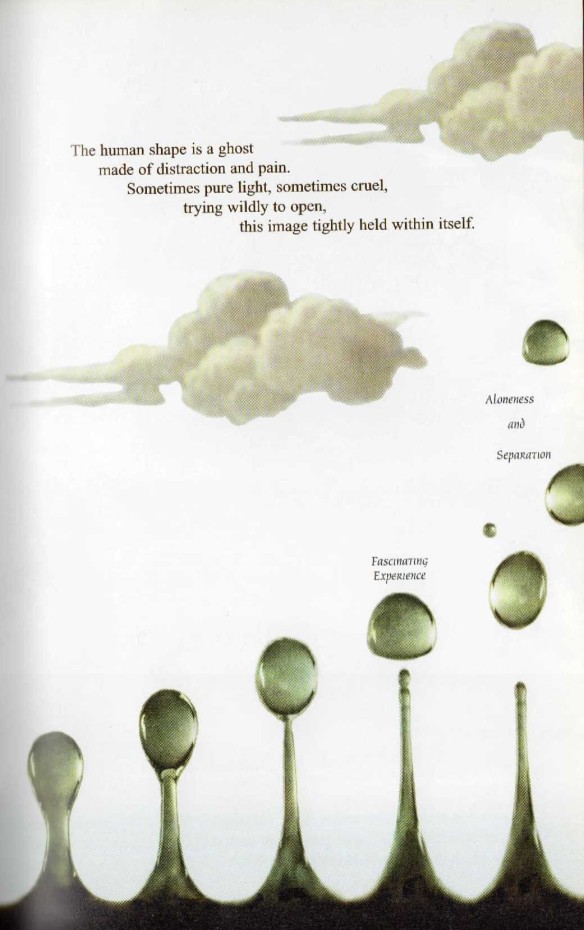
The human shape is a ghost made of distraction and pain. Sometimes pure light, sometimes cruel, trying wildly to open,this image tightly held within itself.
“The mystics are gathering in the street. Come out!”
“Leave me alone. I’m sick.”
“I don’t care if you’re dead! Jesus is here, and he wants to resurrect somebody!”
An intuition is awakened within us of the original human experience, of a deep, effortless unity, not with things, but with the ocean of pure love-being within which they exist. A longing and a thirst…
The thirst in our souls is the attraction put out by water itself:
We belong to it, and it to us.
…and a new attraction is felt, a tidal pull toward something deep and unknown. Something shifts inside. Rumi says:
be like a fish on a beach moving toward wave-sound.
The Prayer and the teachings here are tools to nourish and strengthen this pull, this longing to return to the source…
We can’t help being thirsty moving toward the voice of water.
Milk-drinkers draw close to the mother, Muslims, Christians, Jews, Buddhists, Hindus, shamans, everyone hears the intelligent sound and moves, with thirst, to meet it.
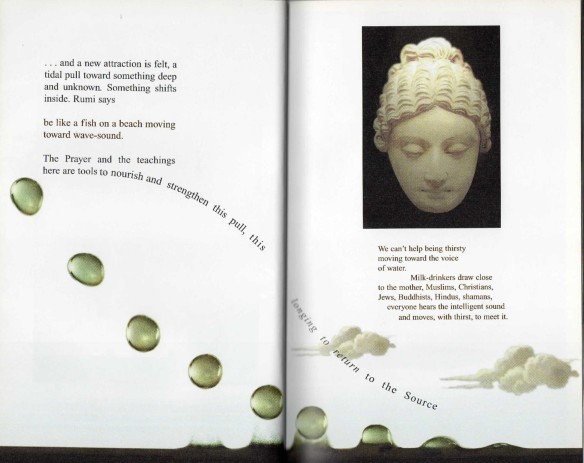
These teachings are part of an ancient Way of returning. They go far back before recorded history. The Way is not “religion,” it is the root from which all religions grow.
Signs of this Way can be found everywhere, among all peoples. The Way exists to serve, and chameleon-like, it takes much of its external coloration from whatever culture or religion it finds itself in.
In the world of mystic Islam, the ones who embrace and transmit this way of returning, of knowing themselves, are often called Sufis.
Their “I” is not what most think of as “I.”
I am cloud and rain being released, and then the meadow as it soaks it in.
I wash the grains of mortality from the cloth around a dervish.
I am the rose of eternity, not made of water or fire or the wandering wind, or even earth. I play with those.
I am
a light within his light. If you see me, be careful.
Tell no one what you’ve seen.
The “I” that so many have defended to their dying breath might be likened to a slightly unstable computer operating system. It’s got wonderful features, but it still crashes and needs regular upgrades. Ultimately it is nothing more than a swarm of charged particles, or rather, it’s only the pattern of charges, completely ephemeral, subject at any moment to error messages, erasure, viruses, random power surges . . . even unfixable crashes. The Sufi’s response to such a marginal exitence is simple: abandon the assumption that this program is who we really are. Marvelous things can now happen. We might identify with wider horizons—like the hard drive, or the processor. Or the network, the World Wide Web, the wide world, or finally, the great sea of being supporting everything.
This opening up of identity is the great work, and no effort in it is ever wasted. Those who find their way to the shore of this sea are ennobled and transformed. Those diving in discover they are no different from the sea. They were God’s secret. Now God is their secret
Dissolver of sugar, dissolve me, if this is the time.
Do it gently with a touch of hand, or a look. Every morning I wait at dawn. That’s when it happened before.
Or do it suddenly like an execution. How else can I get ready for death?
You breathe without a body like a spark. You grieve, and I begin to feel lighter. You keep me away with your arm, but the keeping away is pulling me in.
Where do we begin? The arts of starting out, of soul-turning, of returning to the vast bright waters of universal consciousness are all found in the realm of prayer.

A wicker basket sank in the Ocean, saw itself full of seawater,
decided it could live independently. Left the ocean, not a drop stayed in it.
But the ocean took it back
For God’s sake, stay near the sea! Walk the beach.
Your face is pale.
I am sinking in the ocean of this subject.

A man in prison receives a prayer rug from a friend. What he had wanted, of course, was a file or a crow-bar or a key! But he began using the rug, doing the Five-Times Prayer before dawn, at noon, midafternoon, after sun-set, and before sleep. Bowing, sitting up, bowing again, he notices an odd pattern in the weave of the rug at the point where his head touches. He studies and meditates on that pattern, gradually discovering that it is a diagram of the lock that confines him to his cell and how it works. He’s able to escape.
Anything you do every day
can open
into the deepest spiritual place,
which is freedom.
What nine months does for the embryo
Forty early mornings will do for your growing awareness.
There is no single word in English that conveys the scope of the Arabic word Salat. “Prayer,” “blessings,” “supplication,” and “grace” are implied, but all fail to convey the Salat’s marvelous integration of devotional heart-surrender ‘with physical motion.
In Salat, our entire being is engaged in a single luminous event.
The Salat that we practice begins with the Miraj, the mystic Night Journey of . the noble prophet Muhammad. Called. from his meditation into superconsciousness, he ascends through the heavens and beyond to mingle and merge with the Lord and Creator, light upon Light.

Returning, he brings back the earthly forms of these celestials adorations.

The prayer is gifted not to one tribe or to one race or one religion but to all humanity, and we present it here as such, a treasure for everyone.
Moving with the Prayer as response to inner need draws one into the precious community of mystic lovers everywhere.

At the Call says the Book of Revelation,
leave your trading and hasten unto remembrance.
The Prayer lends a new life to the day, binding it into the rhythm of a sacred circle. Like a waterwheel that ceaselessly catches water out of a stream and spills it into a garden, The Prayer lifts us up again and again out of our preoccupations and sets us into a sacred time. The Prayer empowers us to put aside the ten thousand cares and realign to the unity and blessedness intrinsic to all things.
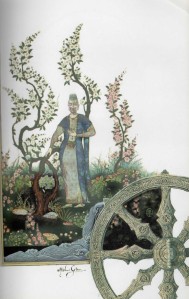
Be courageous and discipline yourself.
Work. Keep digging your well.
Don’t think about getting off from work.
Water is there somewhere.
Submit to a daily practice.
Your loyalty to that
is a ring on the door.
Keep knocking, and the joy inside
will eventually open a window
and look out to see who’s there.
 The Prayer is a deep psycho-logical force field to help us over-come our mole-like resistances to the light. The Prayer is an unfolding series of archetypal motions and gestures that appear in endless variation throughout all the devotional practices of the human family.
The Prayer is a deep psycho-logical force field to help us over-come our mole-like resistances to the light. The Prayer is an unfolding series of archetypal motions and gestures that appear in endless variation throughout all the devotional practices of the human family.
Salat is a remarkably compact and focused exercise. It gently returns our lives to “that which we really love” five times every day, and grounds that returning in the movements and knowledge of body-wisdom.
The body itself is a screen to shield and partially reveal the light that’s blazing inside your presence.
-The Times
Following celestial law, the earth each day performs a complete turning. The light moves through five stages as the sun dawns, climbs to its zenith, descends downward in the slanting rays of aftemoon, sets in glowing colors, and disappears into darkness. For the Sufi, this cycle is a mirror of the human life span: our dawing into the world, our growth, maturation, decline, and death. In these five stages, the soul makes its journey around another sun that never rises or sets.
The Prayer invites us to awaken from the superficial self at these moments of the day. By aligning our devotional work with these natural times of power we start to move with the rhythms of God’s creation in a new way, attuned to the mystical correspondences between outer and inner and to the seasons of life.
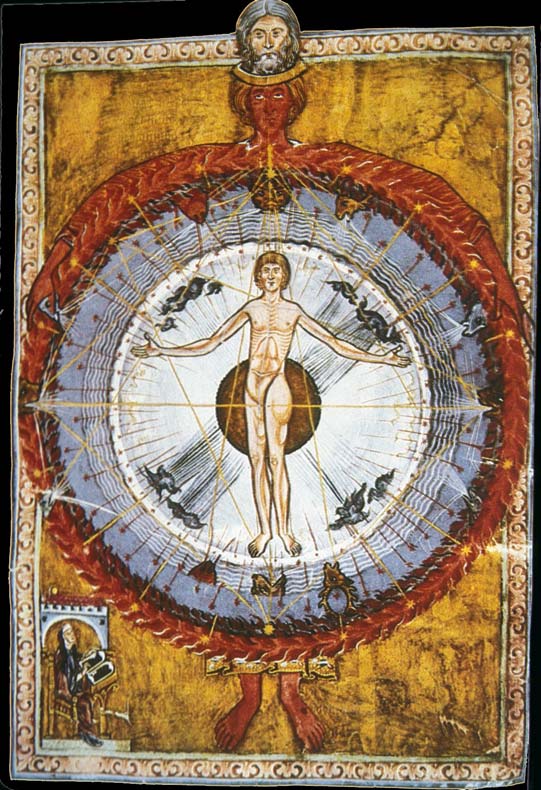

see: Hildegard of Bingen: Viriditas – the Greening power of the Divine –
Think of how PHENOMENA come trooping
out of the Desert of Non-existence
into this materiality.
Morning and night,
they arrive in a long line and take over
from each other, “It’s my turn now. Get out!”
A son comes of age, and the father packs up. This place of phenomena is a wide exchange of highways, with everything going all sorts of different ways.
We seem to be sitting still, but we’re actually moving, and the Fantasies of Phenomena are sliding through us like ideas through curtains.
- MAY THIS INTENTION BE FULFILLED
The Five Times of Prayer are linked with the five elemental forces of Earth, Fire, Water, Air, and Ether.
—————
Note: Man’s Nature
When God breathed His Spirit into Adam, Ibn ‘Arabi says, the profusion of the Breath generated the quadrature of his nature through the four humours: yellow bile, black bile, blood, and phlegm. These four natures of the human biological structure derive from the four principal elements (arkin): Fire, Earth, Air, Water. The yellow bile came from Fire, the black bile from Earth, blood from Air, and phlegm from Water. In addition, God provided man with four natural forces—attractive, fixative, digestive, and repulsive—to enable the functioning of these natures. This quaternary pattern reflects the divine creative quadrature—Life, Knowledge, Will, and Power—the model for all created quadratures.
 These four natures, as the four principal elements, are referred to as “arkin,” plural of rukn, a “corner” or “corner pillar,” giving the imagery of a quadrangular “structure.”
These four natures, as the four principal elements, are referred to as “arkin,” plural of rukn, a “corner” or “corner pillar,” giving the imagery of a quadrangular “structure.”
According to Ibn ‘Arabi, this is the primary “struc-ture” of being: “God established being upon quadrature and made it for himself as a house standing upon four arkan, for he is the first, the last, the outward, and the inward.”
These four attributes formed the primary quadrature that necessitated the establishment of the “house” of being upon four corner pillars, within the structure of which the world of spirits and the world of bodies were manifested. From the world of divinity this structure prompted the creative attributes of Knowledge, Will, Power, and Utterance, which generated the world of spirits, which is beyond nature, as well as the natural world. The manifestation of the natural quadrature of heat, cold, moistness, and dryness followed and was employed in the generation of the world of bodies, dense and subtle. Before forming the bodies, however, God laid out the spiritual world of “writing” (tadwïn) and “inscription” (tastïr) that produced the original blueprint, al-Ghazâlï’s exemplar. This included the quadrature of the Intellect, the Soul, Nature, and Matter, through the agency of which the four elements (arkân) of Fire, Air, Water, and Earth were generated. It is in this divine and cosmic hierarchy that the four humors of the animal body and the four functioning forces were eventually created.
As a whole constituted from the four natures, man reflects the primary divine quadrature of the first and the last, the outward and the inward in different ways.
The Ether is the fifth element holding all together:
With regard to God, he is the inward; with regard to the world, he is the outward; with regard to God’s intention (al-qasd) in the creation, he is the first; and with regard to his existential formation (al-nash‘), he is the last. Thus man is first in intention, last in existence, outward in form, and inward in spirit. Holistically, “he is to the world as the point is to the circumference.”

——————————–
These five forces fit within a grand living cosmology, and to get inside it we must slip the mechanistic world outlook that imprisons the soul. We must contemplate what the Sufi called the Beginningless Beginning, a dimension that is not so much before time as outside time, and so is also now. This is a deep-water teaching of the Qutb. It is not ordinary information, and we must enter it as a drifting out to sea, as a glimpse through blue green waters at ancient truth-currents no tongue can describe. It is an account told by one who never lies, who can never find words to hold its ineffable truth.
Out of the profound silence of the Beginningless beginning a Divine Longing arises:
I was a Hidden Treasure and I desired to be known.
In response to this Original Intention, a great light upwells from within the Longing, and God beholds it as the beautiful radiance of His own face. This is the Nur Muhammad, pure consciousness aware of itself:
The moment Allah gazes upon this light, all the mysteries that had lain dormant burst from within Him as rays of sparkling luminosity. These are the souls of all creation, and they settle on the primordial elements: earth, fire, water, air, and ether, permeating them with living consciousness.
But by nature these five forces are inimical to each other: water drowning fire, fire scorching earth, and so with the rest. Then Allah places before them the Nur, shining with the radiance of the full moon, resonating with the Great Truth: THERE IS NO COHERENCE, NO MEANING, NO OTHER CENTER BUT GOD. The elements bow in reverence and humility. Forsaking pride of otherness, they are fused into a whole by the compelling beauty and energy of the Nur. Chaos becomes Cosmos.
The archetypal relationship between creation and Creator is established, a ceaseless flow of adoration and praise. In this field, all things flower. This is called Awwal, the Sphere of the Souls.
O God! You are the infinite open ray of light.
You alone are God, transcending everything,
You are all that Adam must become.
You are the tiny seed and the great universe.
You are the refuge, You are the path.
You are the handhold, You are the strength.
You are formlessness, You are form.
You are the bud and the fully opened flower.
You are the jeweled light within the eyes.

A glimpsethrough blue Green waters at ancient truth-currents no tongue can describe.

From Awwal, our souls descend from pure adoration into the dense realm of forgetfulness- our world- and become buried in form of the body,the “shadow of God’s love.” Here the story of the Hidden Treasure unfolds once more. Just as the Nur ( pure Light) emerged from within God, so the Nur must also emerge from concealment within the human heart.
When the soul first put on the body’s shirt,
the ocean lifted up all its gifts.
When love first tasted the lips
of being human, it started singing.
We’re from a country beyond this universe, yet our best guess is
we’re made of earth and ashes.
We go knocking on strangers’ doors to find out who we are.
We search this world for the great untying
of what was wed to us with birth
and gets undone at dying.
Eventually, when our longing grows deep enough, it brings us into the presence of a clarifying intelligence whose task it is to recover the hidden treasure, the “deep truth within a lie.” This is our innate guide, the Qutb. Our scattered thinking and unfulfilled desires resist, but the nature of the Guide is irresistible love.
Why not become fresh from the gentleness of the heart-spring?
Why not laugh like a rose?
Why not spread perfume?
In the supremely human act of submitting to the Guide, the work of release begins. As the separative dynamic of our elemental impulses is understood, the need to be a unified Self becomes an obligation spreading through our life. Innate wisdom begins to cleanse the heart of impurities so that the radiant brilliance of the Nur Muhammad may shine forth. In the presence of this higher organizing principle of light, the elements become a creative matrix of life.
In the end, the hidden treasure of the Nur is finally known on earth as it is in heaven. The veils dividing Creator and creation, seer and seen, fall away.
Rabī’ al-Awwal:
Rabī’ al-Awwal is the third month in the Islamic calendar. The name Rabī‘ al-awwal means “the first [month] or beginning of spring“, referring to its position in the pre-Islamic Arabian calendar. During this month, many Muslims celebrate Mawlid – the birthday of the Islamic prophet, Muhammad. Although the exact date is unknown
The word “Rabi” means “spring” and Al-awwal means “the first” in Arabic language, so “Rabi’ al-awwal” means “The first spring” in Arabic language. The name seems to have to do with the celebration events in the month as “spring” is the end to winter (symbol of sadness) and consequently the start of happiness. The Arabic calendar being lunar calendar, the month is naturally rotating over years and Rabī‘ al-awwal can be in spring or any other season every now and then, so the meaning can not be related to the actual season. See also Time of Spring in Sufism, Traditions and Folklores
THE REAL WORK OF THE FIVE TIMES

Conflict among the five elements obscures the unifying impulse of love. Each element rules certain mental and emotional energies and, according to the teachings of the Qutb, exerts its greatest negative influence during a particular time of day. At these times The Prayer is most effective in transforming these elemental forces.
- DAWN PRAYER
(called Fajr)

Dawn Prayer comes in the sacred hour before sun-rise when a thread of light appears on the horizon. The angelic dimension moves into intimate contact with the ordinary world now, and anyone alert senses a remarkably sweet silence in the airwaves: Breezes stir, birds wake into song, and pilgrims arise. Keeping this prayer loosens the earthy torpor that lies heavily upon us at this hour. Earth is the realm of attachments to form: our own bodies, our possessions, our blood ties and lusts. Earth energies are bom at the base of the spine. If they remain there, we stay fascinated with the things of the world, fearful of change and loss. Fajr releases these grasping earth obsessions into the flowing generosity of dawn.
The breeze at dawn has secrets to telt you.
Don ’t go back to sleep.
You must ask for what you really want.
Don ’t go back to sleep.
People are going back and forth across the doorsill
where the two worlds touch.
The door is round and open.
Don ’t go back to sleep.
- Noon Prayer (called Zuhr)
Noon Prayer comes just after the sun has reached its greatest height in the sky. Fiery power is at its peak, stimulating abundant movement, growth, creativity, and forgetfulness. Human beings are engaged in what Rumi calls desire-singing and rage-ranting, the elaborate language of personality. Elemental fire is centered in the belly and manifests as anger, arrogance, and impatience. Persistent turning to inwardness at this time can transform these wild, surging energies into a passionate search for God. Our spiritual fire is fearlessly intent on annihilating the separate “I” and burning up resistances. You are burning up your soul / to keep the body delighted, says Rumi, but you don’t know what you are doing./ I am another kind of fire.

A candle is made to become entirely flame.
In that annihilating moment it has no shadow.
It is nothing but a tongue of light describing a refuge.
Look at this
just-finishing candle stub as someone who is finally safe from virtue and vice,
The pride and the shame we claim from those.
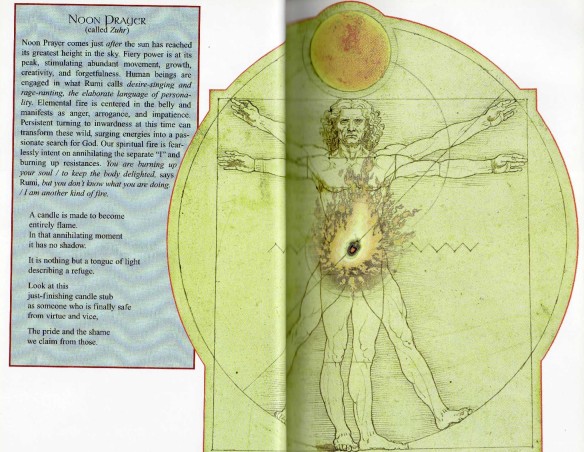
- Afternoun Prayer (called Asr)
Afternoon Prayer comes when the sun has dropped halfway to the horizon and the length of an object’s shadow is twice its height. Every day mirrors the sweep of a lifetime; lengthening shadows now signal the midlife time of crisis. An easy flow into swirling waters of life beckons and each must consciously choose to persevere on the Way of union.
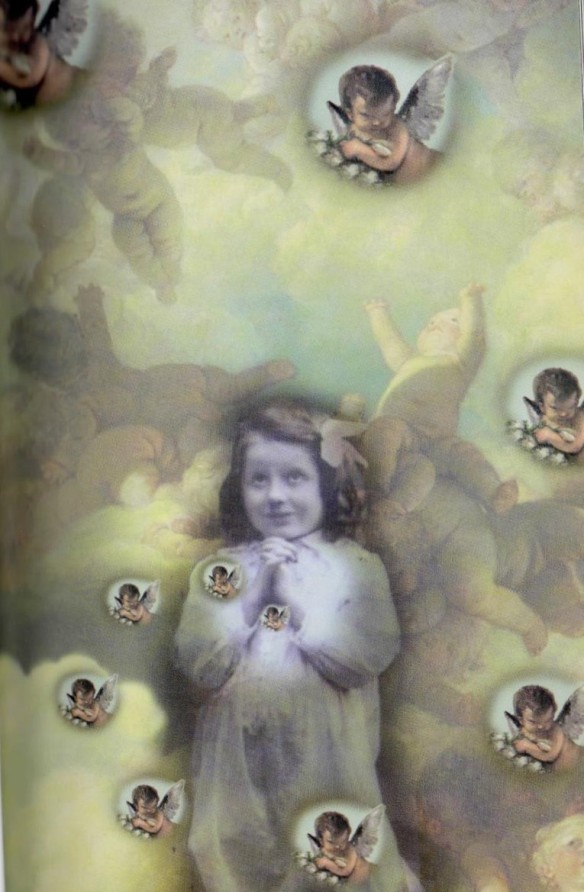
The time of lengthening shadows is the domain of the watery element. Its energies flood our emotional body as turbulent affairs of the heart. On a more subtle level water fascinates us with a vaporous pantheon of spirit guides and spiritual fantasies. The heart is alternately buffeted, perplexed, or seduced by tides of feeling. Desire and fantasy intermingle with genuine soul-longing. Prayer at this time calms this watery confusion. The Qutb says: To complete Asr, we must understand the distinction between becoming one with God, or becoming one with the world.
Rumi said,
“A secret is hidden in the rhythms of music. If I revealed it, it would upset the world.” One afternoon a musician was playing the violin and Rumi was listening with great concentration. A friend entered and said, “Stop this. They are announcing the Afternoon Prayer.” “No,” said Rumi, “this is also the Afternoon Prayer. Both talk to God.”
- Evening Prayer (called Maghreb)
Prayer comes after the sun has disappeared over the horizon and the clouds have lost their redness . The business of the day is completed, and quiet returns to the world. As mirrored in the span of a lifetime, this the age of ripened maturity, when the strength of the body is wanning, and darkness draws closer. Yet the mind is still restless and unhumbled. The element air governs mentation,cerebration and unpredictable thought.
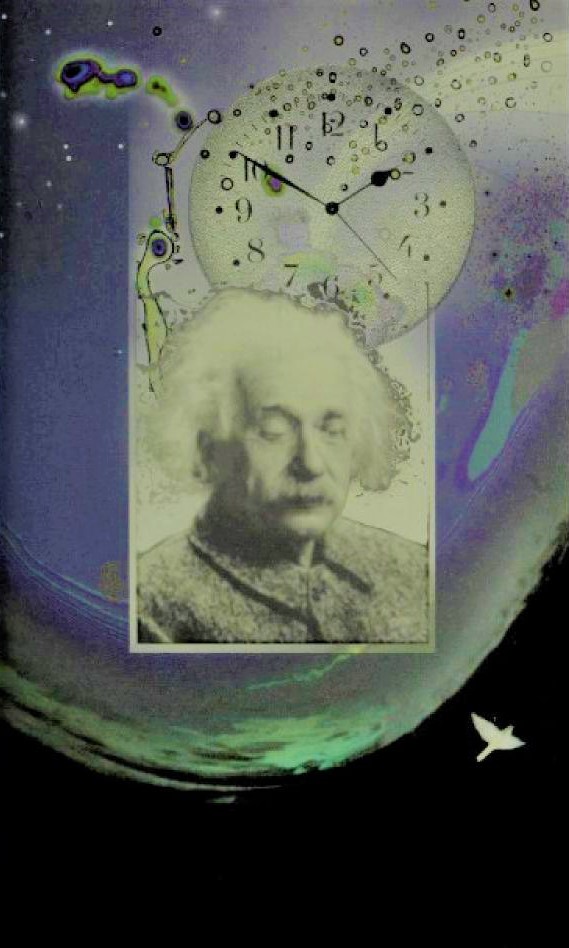
Turning to prayer at this time grounds us in what is real and unchanging, and cuts our elemental attachements to mental airiness.
The thoughts and theories of the day are released into proper perspective, along with the illusion of human will. Of the sunset prayer, Qutb Muhaiyaddeen says, it is the time when the darkness of the world is dispelled by wisdom.
A chunk of dirt thrown into the air breaks into pieces.
If you don’t try to fly,
and so break yourself apart,
you will be broken open by death,
when it’s too late for all you could become.
leaves get yellow. The tree puts out fresh roots
and makes them green
Why are you so content with a love
that turns you yellow

- Night Prayer ( called Isha)
Night Prayer comes about an hour after sunset, when stars are bright and the deep of night has setteld over the earth. In the life cycle, night prayer comes at the time of death, the time of Jesus, the soul of man.
This is when the body is laid in the earth and the soul continues its journey.
Solidity falls away, but the spacious quality of ether grows, hypnotizing us with twinkling illusion.
Turning to prayer at Isha erodes this elemental fascination with etheric phenomena, inclines us once more toward the other direction, where we are neither attracted nor repelled, where the seer and the seen become one, and God alone is real.

The Sufi’s goal is to master the last prayer, the night prayer, before the body dies, and so to die before death.
Prayer goes deep at night.
Images dissolve. There’s only God, and
silence, kindness, and grace.

